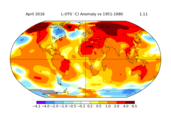Science Source
Projections of temperature-attributable premature deaths in 209 U.S. cities using a cluster-based Poisson approach
- Uses Poisson regressions to model temperature-attributable premature mortality as a function of daily average temperature in 209 U.S. cities by month
- Caclulates future daily average temperatures in each city under Representative Concentration Pathway 6.0
- Finds temperature-mortality relationships that vary by location and time of year
- Finds the largest mortality response during colder months (October–March) was at the beginning (October) and end (March) of the period
- Finds some locations show net reductions in premature temperature-attributable deaths with climate change, due to decreased cold-related deaths
- Results are consistent with most of the previous studies in projecting that climate change will lead to an increase in heat deaths on the order of thousands to tens of thousands of annual deaths by the end of the century compared to the 1990 baseline, and that the increase in deaths from heat will be larger than the reduction in deaths from cold
Related Content
Real Time Data

Feb 25, 2016 | NASA Goddard Institute for Space Studies
GISS Surface Temperature Analysis
Real Time Data

Feb 25, 2016 | The Weather Channel
Allergy Tracker
Science Source
| Nature
The increasing intensity of the strongest tropical cyclones
James B. Elsner, James P. Kossin, Thomas H. Jagger
Headline

Jan 18, 2016 | International Business Times
Warmest December On Record Affected The Economy: Report


